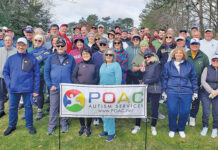
TOMS RIVER – The Township Council held off on their original plan of banning cannabis businesses in town until they have more information about the pros and cons.
Voters passed the state referendum, wanting legalized recreational marijuana. State lawmakers then put together what they thought that should look like. Included in that law was that every town had to decide for themselves if businesses were allowed within their borders.
After two meetings where members of the public pleaded with the council to allow cannabis businesses, the council decided to form a committee to get more information about the issue. The ordinance to ban cannabis businesses was ready for vote during the May 11 meeting, but it has been tabled for two meetings, which means it will be on the agenda for the June 8 meeting.
When the Township Council considers an ordinance, they open up the microphone for members of the public to sound off on it first. During the most recent meeting, a few spoke in favor of the ban, and several more spoke against the ban. There was applause and loud comments throughout the public hearing either supporting or criticizing whoever was speaking.
Resident Laurie Singer described driving someone to Cranbury so they can get their medical marijuana. It’s an hour there, an hour wait, and an hour back. Having recreational for sale close to home would alleviate this problem.
Furthermore, the township has dozens of liquor licenses, and that is never in question. This is a new industry, and the state is regulating it tightly. Municipalities have to approve every cannabis business that wants to operate in town. They won’t be opening the floodgates and losing control. It’s not going to cause the problems that critics foresee.
“I have issue with any governing body that will not give me access to a safe, tested, and fully legal product,” she said.
Hugh Giordano of Blackwood, New Jersey, appeared in his role with the United Food and Commercial Workers Union, which would be representing cannabis workers.
“This (ban) is a direct attack on working people,” he said. These careers offer good pay and benefits, and will grow the middle class. Also, he said that if legal marijuana isn’t available here, people have illegal alternatives.
“You shouldn’t have to drive to get medical marijuana when you can buy fentanyl here,” he said.
Kenneth Gaughran, Toms River, said that everyone is afraid of marijuana being a gateway drug despite no evidence of it. What there is evidence of is that some dealers will upsell their clients to harder, more expensive drugs.
Bad dealers are the gateway, not the drug itself, he said. Allowing it to be sold locally will drive some dealers out of business. So, he said, having legal sales would actually prevent people from moving on to harder drugs.
Another Toms River resident, Brice Morgan, said that the percentage of people in town who voted to legalize marijuana has a larger margin than some of the council members had in their last election. However, they weren’t debating their wins. The council is going against the will of the people, in an election year.
He pointed to council members “Your seat’s not safe. Your seat’s not safe. Your seat’s not safe.”
Daniel Kessel, of Berkeley, also said more people voted for recreational marijuana than for some members of the council.
He referred to a private conversation he had with Council President Kevin Geoghegan in which Geoghegan told him about how many people are calling him asking for the ban.
“We don’t have to call you. We told you how we feel with our vote,” Kessel said.
Kyle Dennerlein, Toms River, said he does consulting work for banks and he’s seen the money that’s going into the industry and urged Toms River to be part of it.
“Marijuana is here. You have to figure out how to capitalize on it,” he said. Other towns have already said no, so there’s an opening.
He added that this new industry is one of the most regulated industries he’s ever seen.
Sam Foster of Brick works for Door Dash. He wasn’t sure what would happen if he got pulled over for a traffic stop in Toms River if he was driving through town to deliver cannabis products. The legal answer was a bit unclear.
Toms River resident John Loiacono said he’s never used cannabis but he drives veterans to get their medical marijuana. He said there’s a world of difference on the way there versus the way home for people.
Some members of the public were in favor of the ban. Elizabeth Puglisi, a nurse, challenged some of the arguments against the ban. There are more important things than profit.
“There are other forms of pain management besides narcotics and marijuana,” she said.
If it is allowed to be sold in town, it will “absolutely increase drug trafficking in our community,” she said.

No Ban – For Now
To be clear, the Township Council didn’t decide against a ban. They just chose to hold off on their vote until a later date.
Councilman Terrence Turnbach suggested that a committee of residents and experts be formed to better educate the council before their vote.
“I read the law and I think a lot of municipalities are rushing to opt out because they’re afraid of losing control,” he said.
“It’s not my opinion” about legalization. “I’m here on behalf of the people and I understand that,” he said.
Laurie Huryk, a nurse, said she had an oncology patient earlier in her career who was not losing weight like other patients. She looked more healthy and admitted it was because her husband drove into the city to buy marijuana for her.
What people don’t understand is that it is so difficult to get medicinal marijuana that they often seek other methods of handling their symptoms.
The facility she saw in New Brunswick was well run, with doctoral students learning horticulture while growing, and had such good security that a neighboring business needed access to their cameras when they got robbed.
Towns have control over land use – they can choose where marijuana can be cultivated, sold, and delivered, she said. By opening the door to recreational dealers that are regulated, illegal dealers will decrease.
Councilman Joshua Kopp said there are some things about legalization that he is against, but “there are topics I need to understand better.” That’s why he also voted to table the ordinance for two meetings.
Councilman Matthew Lotano said that as a small business owner, he knows how restrictive state guidelines can be. The state wants its hand in everybody’s pocket.
While it’s true that 64 percent of Toms River voters wanted recreational marijuana legalized, they didn’t know exactly what form it would take once it actually came to pass. There have been a lot of issues with the way the law was written, and legislators are already trying to fix the problems that they caused.
“This (ordinance) is about not letting Trenton make the decision,” he said, noting that August 22 is the earliest that adult use sales can begin. However, that comes quickly. The ordinance was tabled for a month. The Planning Board will have to review the decision. Those months will go by fast.
Councilwoman Maria Maruca said the state was rushed in coming up with their law and “I don’t think the state got it right the first time. I don’t want to be as hasty as Trenton.”
She also voted to table the ordinance because she wanted to make an educated decision.
Council President Geoghegan said that while a majority of voters asked for legalization, they didn’t know where the shops were going to be. This leads to a NIMBY situation.
“Everybody wants it, but Not In My Back Yard,” he said.
Councilman Daniel Rodrick was the only council member voting not to table it, citing the incidents of marijuana use in schools “skyrocketing” in Colorado after legalization.






